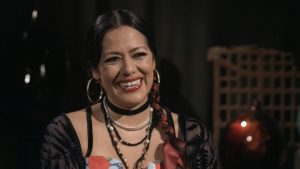The United States of Lila Downs
Description
Sometimes, relationships between neighbors can be soured. Yet, for Mexican-American singer and songwriter Lila Downs, today there is still much to be celebrated.
Featured Artists

Lila Downs is a world-famous singer and actor, known for incorporating indiginous Mexican influences into her popular Latin music.
Downs was born in 1968 in Tlaxiaco, Mexico, and grew up there and in Los Angeles. Her mother was an indiginous Mixtec Mexican; her father was Scottish American. She sings in Spanish, English, and several traditional Mexican languages, and records both original and traditional music. Her lyrics frequently detail the social issues affecting Mexico’s indigineous communities.
She first sang professionally as a child, and gained local popularity in Minnesota in the early 1990s. Returning to Mexico, Downs recorded several albums of traditional music, achieving international success with her fourth LP, La Sandunga (1999). Her rendition of the song “Burn It Blue” from the movie Frida was nominated for an Academy Award in 2002.
She was nominated for a Grammy for her sixth album Oje de Culebra (2008) and won one for her seventh, Pecados y Milagros (2011), which reached number 52 in the Billboard album charts. She received her third Grammy nomination in 2014 for the album Raiz.
Transcript
Lila Downs’ father wanted her to hear the world. He wanted her to know it.
Lila Downs: I remember, every night, he would have his two Scotch on the rocks. I would make him some eggs, and he would sit down in the living room. He would listen to Miles Davis, maybe Bach sometimes. He would ask me if I read the article in The New Yorker, and we would discuss.
An only child, Downs grew up enriched by the Oaxaca of her Mixtec mother and the Minnesota of her Scottish-American father, and traveling between the two. She was only 16 when her father died. The loss brought hard, essential lessons about identity and female opportunity.
Downs: The white man in the family was gone. And suddenly, in Mexico, especially, I noticed that people kind of would stop addressing me, simply because the man in the family was gone.
AJC: Wow.
Downs: It’s a very serious lesson to learn at that early age. And I think that’s why singing songs about women is important to me, because I find that there are a lot of young women who do not have the same opportunities that young men have. And so, I truly believe in creating songs about these amazing people who, in spite of all of this, you know, rise to the occasion and continue being role models for our society.
In 2002, Downs was nominated for an Oscar for “Burn It Blue,” a signature song from the movie Frida. And though classically-trained, Lila Downs makes music firmly rooted in the Oaxaca culture that she works so hard to preserve.
Downs: I know that the “Cumbia del Mole” for example, the people in Oaxaca now say that they don’t know who wrote it. And I think that’s the ultimate compliment to a composition—that they kind of don’t know where it came from. But it’s their song, and that is the coolest thing.
AJC: So you’ve created a real folk song?
Downs: So that’s a real folk song, yeah.
Downs has also sung about the political tempests of the present day. She’s been an outspoken advocate for those who have gone missing: kidnapped students, disappearing journalists. She has sung out against corruption and, at times, her songs have put her in harm’s way. Through it all she accepts who she is—a women with a dangerous side.
Downs is married to her longtime musical collaborator Paul Cohen. Together, they have an adopted son named Benito, who lives with and between his parents’ two cultures—a multicultural dynamic that echoes the past.
Downs: We just went to Argentina, for example, on tour. And Benito was on vacation, so we brought him with us. And when we left—when we came back on the plane—he cried and cried, and it reminded me of attachment, and letting go, and how that was a big part of my life. And whoever grows up bi-cultural, or tri-cultural, or in different communities, this is inevitable. And it creates this nature of knowing how to let go, which, I think, is a very healthy thing to have in your life. In general, we become attached to so many things and places and people and I thinks it’s a virtue to have that. So I see him go through that and…
AJC: And you’ve been through that.
Downs: And I’ve been through that, yeah.
In 2015, Downs headlined a spectacular Day of the Dead concert in Mexico, producing a lavish show of multiple traditional costume changes and high theatrics. This national celebration has deep personal resonance for Downs, who remembers those who have gone before her with the colors, traditions, and native dishes that have been passed down through generations.
Downs: It’s a profound relationship that you have with your “dead ones,” as we say it.
AJC: Is the joy more unbridled? Is the joy purer in the pre-Christian celebration of the Day of the Dead, do you think? ‘Cause the show you produced certainly was very low on any kind of unhappiness.
Downs: I think it is. I think it’s always about the balance. If you’re going to be a little bit sad, then you must be a little… You must be happy. And if you’re going to remember the dead, then you must drink, and eat, and have a party. It’s always about that balance.

